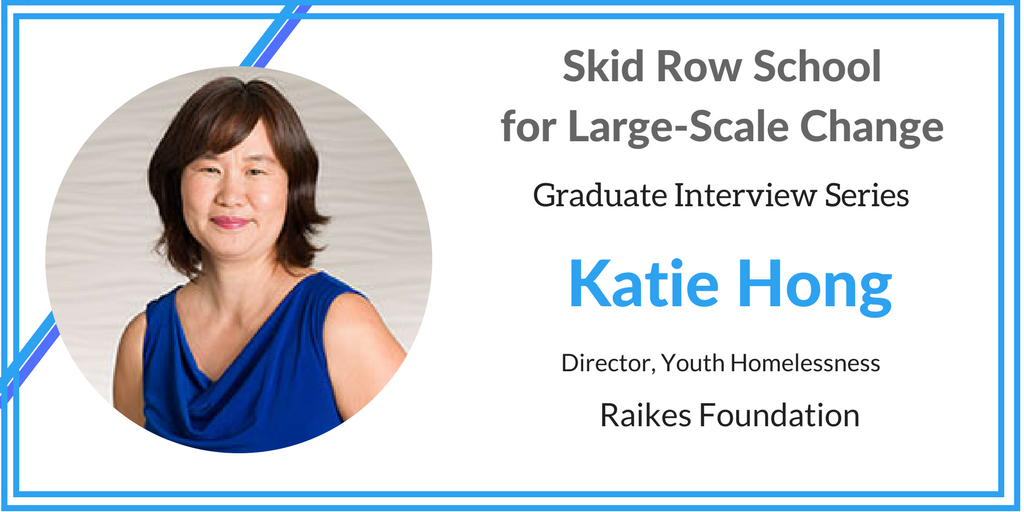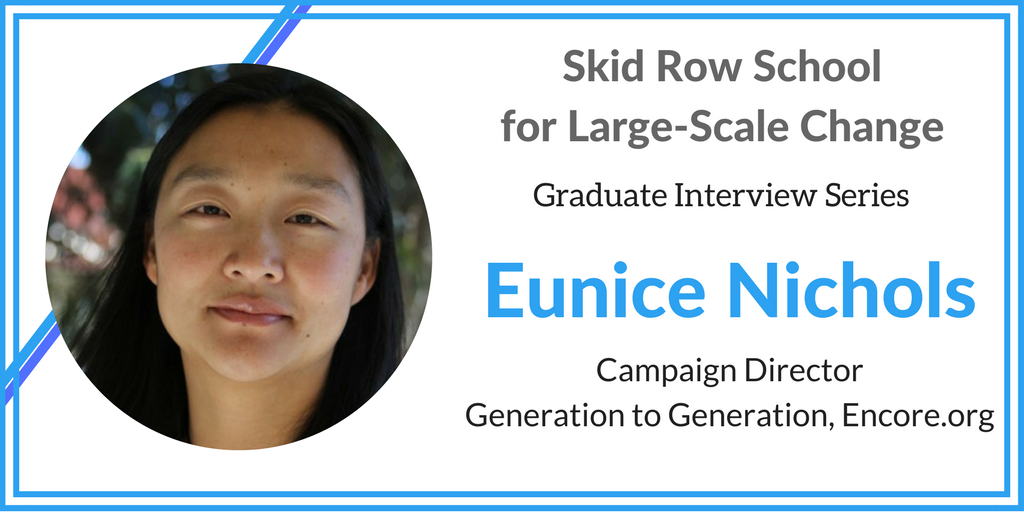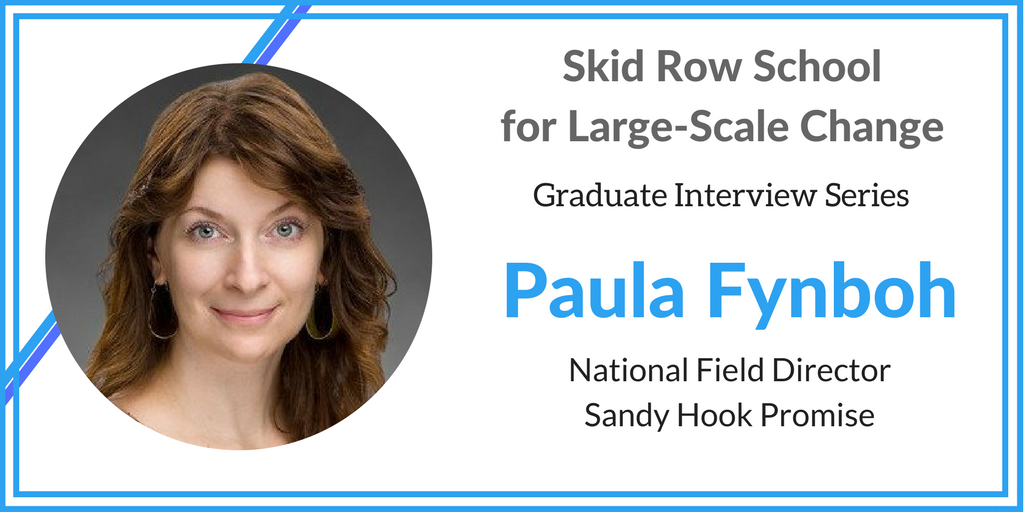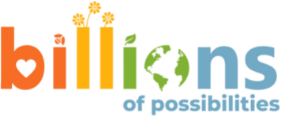by Rebecca Margiotta | Jul 19, 2017 | Alumni Profiles

Meet Katie Hong, a director at the Raikes Foundation. She leads the foundation’s efforts to prevent and end youth and young adult homelessness and supports its national education strategy.
What is the core/heart of the Raikes Foundation’s intervention?
We want to see youth and young adult homelessness ended in this country. That means we aspire to see a future where youth and young adult (YYA) homelessness is a rare occurrence but if it happens, it is also a brief and one-time occurrence. Young people, who are struggling with the crisis of homelessness should not be forced to sleep outdoors or in places not meant for human habitation because communities don’t have an adequate safety net system. The Raikes Foundation has been focused on supporting a coordinated community approach to making YYA homelessness rare, brief and one-time in our local community of Seattle/King County and also supporting efforts to improve the willingness and ability of communities across WA state and the nation to prevent, reduce and end YYAH.
We like to quote Don Berwick where he says “Some is not a number, soon is not a time.” What is your current 18 to 36 month aim?
By 2020, we would like King County to achieve “functional zero” for youth and young adults experiencing homelessness. This means that our community has an adequate safety net system such that no unaccompanied young adult is experiencing unsheltered homelessness. But it’s critical that we update and identify our specific quantifiable aims with our partners (government funders, service providers, advocates, young people with lived experience) so our hope is that we’ll have a specific 18 and 36 month aim at the local, state and national level by end of this year.
What was the most important take-away for you from the Skid Row School for Large-Scale Change?
There were so many take-aways! The first is the importance of setting explicit and clear targets. It’s important though that these aims are done with key partners and are collaborative aims/targets!
The second is being intentional about change. We say that we are trying to create change, but oftentimes people talk in grand abstract terms. They think about jumping from A to Z, but don’t think about how to move from A to B. We need to think about scale in terms of breaking it up into its components.
The third, is to really think about how to create change. As leaders, we should not assume that if people are resistant to change it means they are trying to be difficult. That’s not always the case. You need to break up change to most influence people’s behavior. Skid Row School was good for learning about external skills. But, what was also good was the emphasis on the inner work. Thinking about: What gets in the way of you being ambitious and setting clear targets and thinking about change management? How do you become more self aware and how do you navigate that change? Many training programs are not holistic in presenting both external and internal skills. All of the tools and skills are really important. But, an equal emphasis on managing your whole self so that you and your whole self can be an agent of change. I really thought that was awesome.
What advice would you give a new leader who really wants to spread/scale their work?
The immediate thought is to be really clear about what is the change you want to see in the world. Even down to whose behavior are you trying to change and what exactly do you want them to do. For example, we know schools need to do a better job of identifying homeless students and providing services to prevent and/or intervene early to provide services for homeless students. But we need to come 2-3 levels down and be much more specific about what needs to be done and by whom. There are so many different stakeholders in schools and there are so many intervention options. If you want to change, you have to be specific about who you are talking to and specific about the intervention you want them to do (“What’s our Time Square?”). Those are the things that we want to be more clear about because this is what will get in the way of creating change.
The other thing I would say is besides being clear about what you want to see, it’s about being intentional about when is the right time to scale and move with urgency. I totally get the mission of the Skid Row School is to accelerate large-scale change. There is a sense of urgency. Our problems are so vast and urgent. But, that also needs to be teamed up with moving slow so that you can move fast. This is especially true for foundations because we have big ambitions. Often, our ultimate goal is to scale and see the promising interventions and strategies everywhere. But, let’s not skip over the modeling, prototyping, and making sure it can work. Otherwise, you can do more harm than good.
What gets you motivated and out of bed every morning?
I’m motivated to use my talent, skills, and passion to work with others in improving the community around me. How do we create a more just and equitable society so that all children have equal opportunity to be successful? There is so much we can be doing to better empower and support all of our young people.
How do you recharge your batteries and take care of yourself?
I do a couple of things. One, is that I do something every day to get out of my head and use my body. Exercise and physical activity are a big part of my life. It’s really easy for me to get in my head and stay there! The discipline of doing things like yoga, running, walking, and swimming is good for me. I need to do something with my body outdoors because being outdoors gets me outside of my head.
Also, I like to read and listen to podcasts. I also like to surround myself with like-minded people who struggle with same issues and challenges of scaling change. I love participating in communities like the Skid Row School because it’s a powerful reminder that people are asking themselves similar questions. It’s nice to know that people before me struggled with similar issues and people behind me will too. It makes you feel a true sense of belonging – we’re all struggling with similar challenges!
If you had three wishes for humanity and the planet, what would they be?
- Seek to see – meaning that so many of us have blinders on and we only see our part of the system (like the Sufi story of touching our part of the elephant). We are all part of systems and yet the whole system is often invisible to us. Every system is perfectly designed to produce the exact outcomes it is producing. So what is that system? Why is the problem today the way it is? My first advice is to “seek to see” – take off the blinders and start seeing the structure, processes and mindsets that are producing the outcomes we are seeing.
- Be the change that you want to see in the world. That’s my aspiration. I want to be more awake. So if that’s my true aspiration for the world, I try to live up to that every day. Instead of complaining and feeling discouraged when I face a challenge, I think about how I can better understand, learn and take action. Oftentimes it’s easy for us to say that the problem is out there, but how are we part of that problem?
- Find your true vocation as our world needs it! Where is your deepest passion and gladness? And how do you use that to improve the world? If you’re able to find your deep gladness and passion, then I truly believe that you can use those to meet the world’s greatest needs. That’s how I define vocation – a place where your deep gladness meets the world’s greatest needs.
by Rebecca Margiotta | Jun 8, 2017 | Alumni Profiles

Meet Eunice Nichols. Eunice is a Vice President at Encore.org and serves as the campaign director for Generation to Generation, a 5-year initiative to mobilize one million adults 50+ to help young people thrive.
What is the core/heart of Encore.org’s Generation to Generation intervention?
The heart of the Generation to Generation campaign (www.iamgen2gen.org) is reducing social isolation and generational segregation that disproportionately affects both older adults and children — in particular children growing up in challenging circumstances. We want to connect the two, young and old, for the benefit of all.
Our five-year campaign involves three elements:
- We’re telling a new story about uniting the generations in ways that cross boundaries of age, race and class. We want to see a society where people are living their legacy now — where older generations standing up for kids becomes both the expectation and norm in later life.
- We’re building a diverse action-oriented community dedicated to upholding that vision, and making it a reality on the ground. We want to point people to concrete actions they can take to make a difference, and for them to feel a sense of co-ownership in mobilizing others to join them in standing up and showing up for kids.
- We’re also spurring innovation and sharing best practices for involving people over 50 in the lives of children and youth. We have developed a learning network of organizations and communities that are piloting or scaling the engagement of older adults in their work, and we just launched the Encore Prize: Generation to Generation Challenge. The Encore Prize awards $100,00 in cash prizes and coaching to the next generation of programs and products being created to harness the talents of adults over 50 to help kids at risk.
We like to quote Don Berwick “Some is not a number, soon is not a time.” What is your current 18 to 36 month aim?
Our near-term goal is to engage 20,000 participants by the end of 2017, including 100 partner organizations and 50 significant voices (people with a public platform that are sharing the new narrative), and to showcase 20 innovative organizations or communities where the experience and talents of older adults are being leveraged to help kids thrive.
What was the most important take-away for you from the Skid Row School for Large-Scale Change?
First, I would say the power of personal narrative. I love the Story of Self framework presented at Skid Row School. It’s been helpful for me both personally and for the campaign. Participants of the school told their story during our time together. I was struck by how often people were inspired to do their current work because of the powerful presence of an older person in their life. It drove home the message that our campaign needs to tap into that relatable story of an older person speaking into their lives at a formative moment — or the story of wishing they had had that voice during challenging times. That’s the heart of the campaign: that every child deserves a web of support, and every older adult has something to give.
Also, everything we learned about the Switch framework has been helpful. Bright spots are not rare, and we should be eager to look for them and learn from them. Our campaign has been trying to operationalize a number of the Switch learnings.
Lastly, I really appreciated the session on working in our genius. We have a fast-moving campaign. We’re constantly shifting and learning, and as we do that it has been a good challenge to incorporate the concept of “genius”– looking at the work in front of us, what skills individuals can contribute, and whether we’re utilizing people to the best of their passions and skills, independent of their title or role. Our campaign is all about helping older adults and kids thrive — we need to think about that for our team, too, so that we can all be operating in our place of greatest contribution and joy.
What advice would you give a new leader who really wants to spread/scale their work?
Many of us have had a lot of previous experience running a nonprofit, program, or initiative. I didn’t realize what a different beast it is to run a large-scale change initiative!
I would encourage new leaders to surround themselves with other leaders who are trying to do equally audacious work in a public forum. It’s scary to put big numbers out there for the world to see. It can bring up a lot of things for you as a leader, in particular the fear of public failure. It can feel quite isolating.
Being involved in Skid Row School, surrounded with people who are doing the same thing reminds you that you’re not the only one doing this type of work. Many people have walked this path before. Knowing everyone is here to support each other makes a huge difference.
What gets you motivated and out of bed every morning?
Literally, the answer is my kids who wake me up at 7 o’clock when they pile into my bed! But they’re also the aspirational reason why I get out of bed. It’s the opportunity to make the world a better place for them as they grow up. I want them to live in a world where older generations standing up for them is the norm — and where they will someday be that older person investing in younger generations.
How do you recharge your batteries and take care of yourself?
That’s an easy one – sleep! When I want to recharge my batteries I sleep for as long as possible. Napping is my superpower — I can nap anywhere, anytime. I’m also an introvert. This work is very people intensive, so I need to intentionally build in alone time.
If you had one wish for humanity and the planet, what would that be?
If I could have only one wish for humanity, it would be for everyone to have someone in their life who’s crazy about them, and ideally, not just one person, but a web of support. We can overcome huge obstacles and challenges when we have somebody in our corner, willing to do anything for us.
by Rebecca Margiotta | May 3, 2017 | Alumni Profiles

Meet Paula Fynboh. Paula leads the national outreach and program strategy for Sandy Hook Promise with the goal of bringing Sandy Hook Promise’s no-cost, easy to implement prevention actions and resources to schools and youth serving organizations across the country.
What is the core/heart of Sandy Hook Promise’s intervention?
We believe that gun violence is preventable when we know what signs to look out for. When people know what to look for, they have the ability to intervene and take action before violence takes place. At Sandy Hook Promise, we provide training and programs that help protect people from gun violence.
We like to quote Don Berwick’s “Some is not a number, soon is not a time.” What is your current 18 to 36 month aim?
We are about to hit the 2 million mark for the number of individuals trained. We’d love to train 5 million people in the next three years.
What was the most important take-away for you from the Skid Row School for Large-Scale Change?
The first big take-away is the time that we spent on Switch. In my head, everything makes sense from that session. I see the importance of the Switch techniques showing up within my team of seven. I’ve learned that it’s important to be able to step outside of my own head, look at what my team is doing, and understand what they’re trying to achieve. For example, at times, it seems we’re making it too complicated or confusing for people who want to sign up for our programs. We have asked ourselves: How can we clear the path for our participants? How do we provide enough information for people to take action? How do we not overwhelm them with information? We want to make it as easy as possible for people to take action.
Additionally, we also need to be okay with people flying in the same direction, but not necessarily doing everything that we want them to do. In the end, they are still taking action. There’s a lot that can get done, but we don’t want to make it more complicated for us or them. But, we also want people to take action. We should be able to look at it with clear eyes to set people up for success. Also, we need to learn to be okay with the fact that not everyone will take action. The scale and the letting go component are very important.
The other thing I got a lot of benefit from is talking about authentic leadership and how to spend more time in your genius zone versus what you’re good at. In that whole pyramid of villain, victim, or hero – I’ve seen a lot of hero in my own style. I’ve started to ask different questions when my team comes to me for help: Where do you need help? Can you take the first stab at that and then come back if you need support? I’m giving my team members more responsibility instead of taking ownership of everything. In this way, I’m getting stronger in my own feedback. I’m creating accountability, coaching, and giving people the chance to come with me in the organization. I always wonder how to make everyone on the team as strong as possible. This is a big personal goal that I’ve taken away from Skid Row School.
What advice would you give a new leader who really wants to spread/scale their work?
I would say to set clear goals. Recently, I worked with my team to map out what we need to do to reach our outcomes. It gave them an opportunity to improve their leadership skills. But at the same time, all of the work groups presented back with a laundry list of ideas without taking a step back to create a system for those ideas. As leaders, we always think we’re clear with directions, but we can always be clearer.
Lastly, leaders need to get back to authentic leadership!
What gets you motivated and out of bed every morning?
What gets me out of bed is that I think that I’m accomplishing something. It’s a sense of accomplishing something beyond myself – protecting kids, but also empowering people in their community. Also, there’s a sense that I’m growing as a leader – both personally and professionally. It’s important for me to do good work for the organization. But at the end of the day, it’s also important for me to step away to say this is what I did for myself.
How do you recharge your batteries and take care of yourself?
I would answer that in terms of our organization infrastructure. I travel a lot – it can be 3-4 weeks per month. But, when I’m not traveling, I work from home. That flexibility is great. Today, I’m at home in my yoga clothes and with my dog. I can still get my work done. I appreciate the autonomy and flexibility with the organization infrastructure.
Additionally, I exercise including running, yoga, and walk my dog. I also enjoy being around people that I love and who I can talk with about serious or super silly stuff. I love traveling. Also, I enjoy Instagram. I love going for a walk, seeing something pretty, and taking a picture of it to share with the world.
If you had three wishes for humanity and the planet, what would they be?
- Be kind.
- Take responsibility for the world around you – whether that seems like a really simple deed for the day such as recycling, putting something in the trashcan, or saying hello to someone. We make change more complex than what it really needs to be.
- We all have an obligation to save ourselves. Our democracy and country is a result of OUR collective action.



